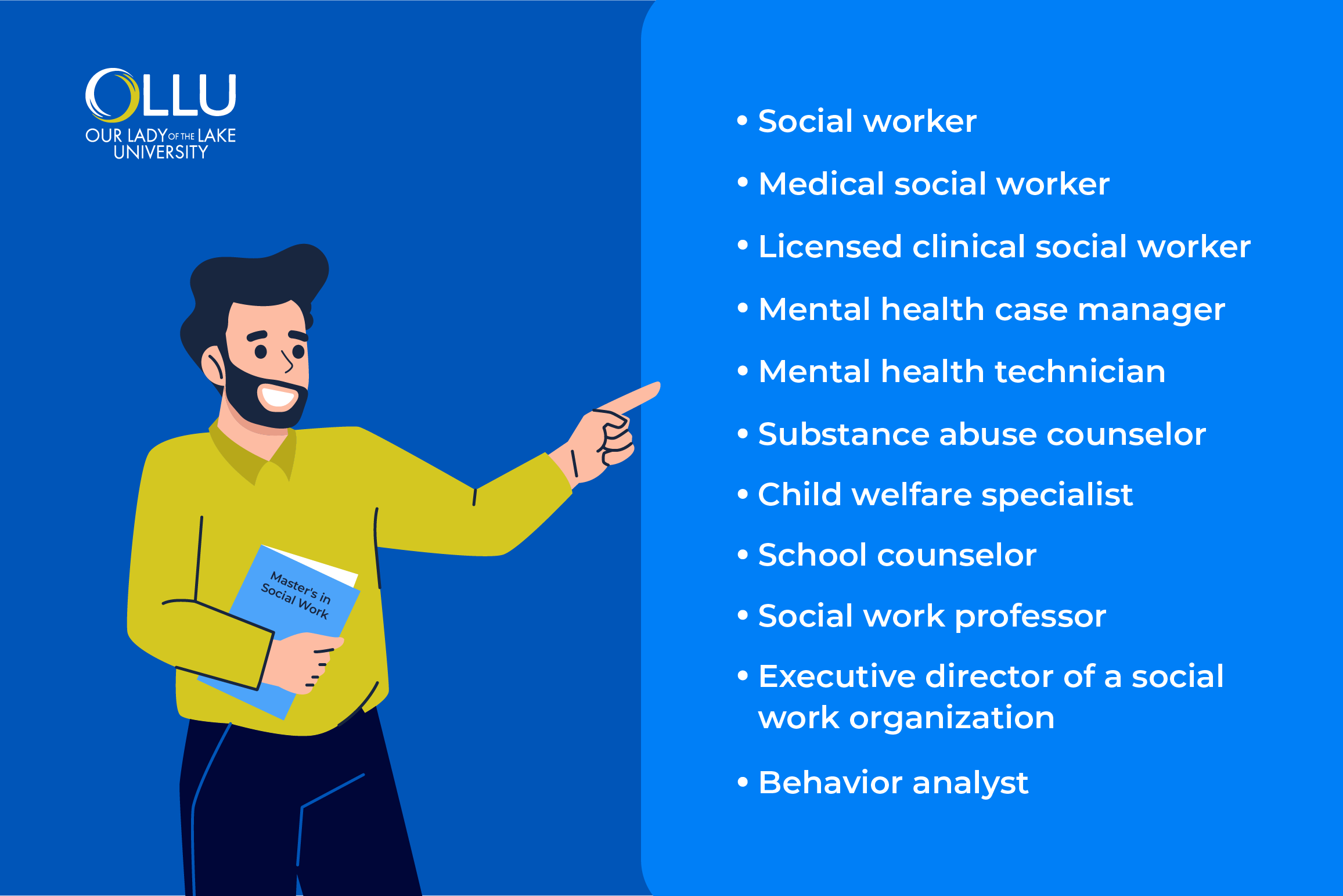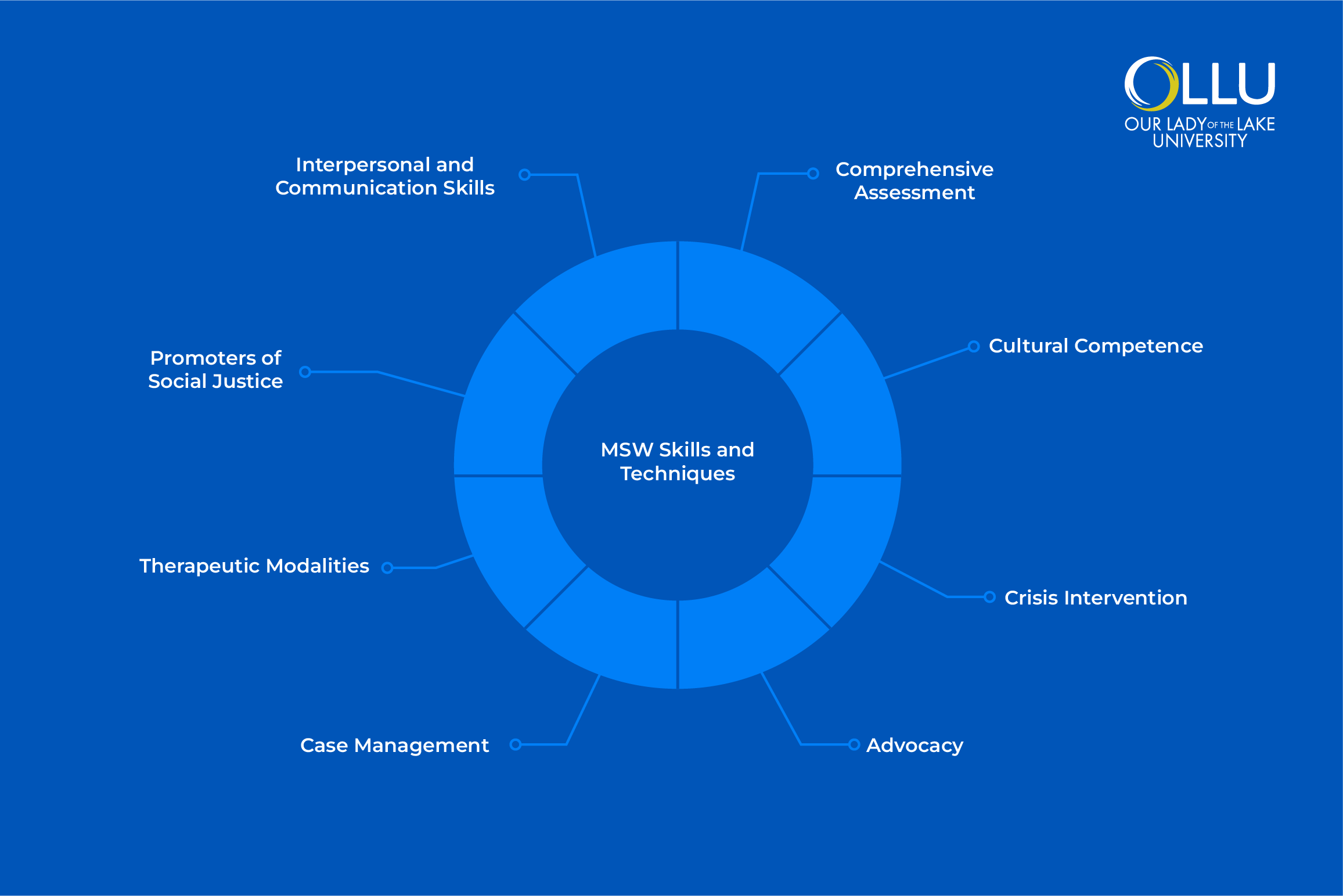What Can You Do With a Master's in Social Work?
Oct 07, 2023

"What can you do with a master's in social work?" This question leads us to discover the various career opportunities where empathy and professional skills converge to tackle significant societal challenges. A Master's in Social Work (MSW) opens doors to a wide-ranging profession centered on enhancing the well-being of individuals, families, and communities. In this discussion, we will explore the different roles you can pursue with an MSW, emphasizing the degree's power to facilitate positive change and promote social justice.
Understanding Social Work
Social work is a dynamic and profoundly humanitarian field dedicated to improving the well-being of individuals and society. It is driven by a commitment to social justice, equity, and empowering vulnerable populations.
Social workers are pivotal in connecting people with the resources and support they need to navigate life's challenges, whether those involve mental health issues, substance abuse, homelessness, child welfare, or aging concerns. Through empathy, knowledge, and practical skills, social workers address systemic inequalities, promote resilience, and facilitate positive change.
This profession operates at the intersection of policy, advocacy, and direct service, making it a critical force for social transformation and the betterment of society.
What Can You Do With a Master's in Social Work?

A Master's in Social Work can lead to diverse career opportunities, all driven by a common purpose: to make a meaningful difference in the lives of individuals and communities. Whether you aspire to provide counseling and therapy, advocate for policy change, work in healthcare, or address pressing social issues, an MSW equips you with the knowledge and skills to excel in various roles within the field of social work. In the following sections, we will explore some of the key career paths and specializations an MSW can offer, highlighting the impact and potential of this versatile degree.
Social worker
A career as a social worker involves supporting and assisting individuals and communities facing various challenges. Social workers help people cope with life's difficulties, connect them to essential resources, and advocate for their well-being.
In the United States, the estimated total pay for social workers is approximately $73,443 per year, with salaries typically ranging from $60,000 to $90,000 annually.
Medical social worker
Medical social workers provide emotional and practical support to patients and their families within healthcare settings. They address the psychosocial aspects of medical care, assist with discharge planning, and offer emotional counseling.
In the US, medical social workers earn an estimated total pay of around $77,323 annually, with salaries ranging from $54,000 to $111,000 annually.
Licensed clinical social worker
Licensed clinical social workers are trained to provide mental health services to individuals in clinical settings. They assess mental health issues, offer therapy and counseling, and contribute to treatment plans.
In the US, licensed clinical social workers earn an estimated total pay of about $89,002 per year, with salaries typically ranging from $62,000 to $128,000 annually.
Mental health case manager
Mental health case managers coordinate and advocate for the care and support of individuals with mental health needs. They help clients access appropriate services, create treatment plans, and monitor progress.
In the United States, mental health case managers receive an estimated total pay of approximately $59,888 annually, with salaries ranging from $40,000 to $91,000 annually.
Mental health technician
Mental health technicians play a crucial role in the care and treatment of individuals with mental health disorders. They assist with daily activities, provide emotional support, and help maintain a therapeutic environment.
Data shows that mental health technicians in the US earn an estimated total pay of $43,114 per year, with salaries typically ranging from $35,000 to $54,000 annually.
Substance abuse counselor
Substance abuse counselors support and guide individuals struggling with substance addiction. They conduct assessments, develop treatment plans, and provide counseling to help clients overcome addiction.
In the US, substance abuse counselors earn an estimated total pay of around $60,580 per year, with salaries ranging from $41,000 to $89,000 annually.
Child welfare specialist
Child welfare specialists are responsible for ensuring the well-being and safety of children in potentially at-risk situations. They assess family dynamics, provide support services, and may recommend protective measures when necessary.
The estimated total pay for child welfare specialists in the United States is $58,434 annually, with salaries typically ranging from $41,000 to $85,000 annually.
School counselor
School counselors work in educational settings, providing academic, social, and emotional support to students. They assist with academic planning, address behavioral issues, and help students navigate personal challenges.
In the US, school counselors earn a total pay of $74,698 per year, with salaries typically ranging from $61,000 to $92,000 annually.
Social work professor
Social work professors are educators with expertise in the field of social work. They teach students, conduct research, and contribute to developing social work knowledge.
In the United States, social work professors earn an estimated total pay of approximately $89,874 per year, with salaries typically ranging from $56,000 to $145,000 annually.
Executive director of a social work organization
As an executive director of a social work organization, you oversee its strategic and operational aspects, ensuring its mission is carried out effectively.
In the US, executive directors of social work organizations earn an estimated total pay of around $106,710 per year, with salaries ranging from $65,000 to $177,000 annually.
Behavior analyst
Behavior analysts specialize in assessing and designing interventions for behavior-related issues. They work with individuals with developmental or behavioral challenges, developing strategies to improve behavior and quality of life.
The total pay for behavior analysts in the United States is around $96,634 annually, with salaries typically ranging from $60,000 to $155,000 annually.
MSW Skills and Techniques

A Master's in Social Work equips professionals with a diverse set of skills and techniques that are instrumental in addressing the complex social and emotional needs of people, such as:
Interpersonal and Communication Skills: MSW graduates excel in building rapport and trust with diverse clients, fostering effective communication.
Comprehensive Assessment: They are skilled in conducting thorough assessments, identifying strengths and challenges, and formulating intervention strategies.
Cultural Competence: MSW programs emphasize cultural sensitivity, enabling social workers to navigate diverse cultural backgrounds respectfully.
Crisis Intervention: Trained in crisis management, they can support clients during difficult times and connect them with crucial resources.
Advocacy: MSW professionals are adept advocates, championing the rights and needs of clients within various systems.
Case Management: They possess strong organizational and case management skills, ensuring clients receive comprehensive care.
Therapeutic Modalities: MSW graduates often specialize in therapeutic approaches like cognitive-behavioral therapy, family systems therapy, or trauma-informed care, tailoring their methods to clients' needs.
Promoters of Social Justice: Armed with these skills, social workers promote well-being and social justice in their communities, making a meaningful impact.
Career Advancement Opportunities
A Master's in Social Work opens doors to career advancement opportunities in social work and related areas. With experience and expertise, you can progress into supervisory and management roles, overseeing teams of professionals and programs.
As part of your social work career, you can pursue licensure as a Clinical Social Worker (LCSW). This will allow you to provide mental health services and potentially earn more money. Additionally, you can specialize in healthcare, education, substance abuse treatment, or policy advocacy to expand your career and personal growth opportunities.
If you're interested in academia and research, pursuing a Ph.D. in Social Work can lead to roles as professor, researcher, and thought leader. Furthermore, there are opportunities to move into administrative positions, such as executive director of social service organizations or director of government agencies, where you can influence policies and make systemic changes. These varied paths for career advancement make an MSW a dynamic and rewarding investment in one's professional future.
The Demand for Social Workers
The demand for social workers is projected to grow by 7% from 2022 to 2032, exceeding the average for all occupations, with an estimated 63,800 job openings annually. This growth varies by specialization: child, family, and school social workers will focus on parenting skills, child abuse prevention, and alternative homes for children, although budget constraints may limit their employment. Healthcare social workers will assist aging populations with treatment adjustments. Mental health and substance abuse social workers will see increased demand due to more seeking treatment, including opioid recovery, and handling redirection of drug offenders to treatment programs.
The Bottom Line
In conclusion, the possibilities that come with a Master's in Social Work are both diverse and profound. Whether you aspire to be a compassionate counselor, an advocate for policy change, or a leader in social work education, an MSW equips you with the skills and knowledge to make a meaningful difference in the lives of others.
To embark on this transformative journey and explore the limitless potential of an MSW, consider joining the Master of Social Work program at Our Lady of the Lake University (OLLU). Take the next step in your career by visiting OLLU's MSW program page today and discover how you can contribute to positive change in social work. Your journey starts here.
Frequently Asked Questions (FAQs)
Is a Master's in Social Work worth it?
Yes, an MSW holds excellent value because it opens doors to fulfilling career paths as well as often provides increased earning potential and opportunities for professional growth.
Is a Master's in Social Work hard?
Like any graduate program, an MSW may be academically demanding for some, but with hard work and commitment, you can complete it and have a fulfilling career.
What is the lowest-paid social worker?
The lowest-paid social workers are usually in entry-level roles.
What is the highest-paid social worker?
Those with advanced degrees and experience, like clinical social workers with LCSW licensure, social work professors, and executive directors, tend to earn more. Salaries vary by location and experience.